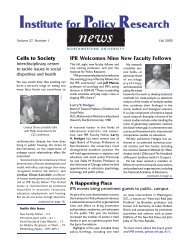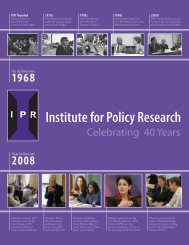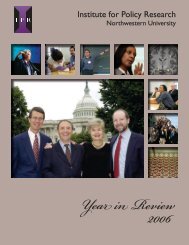Highlights of 2011 - Institute for Policy Research - Northwestern ...
Highlights of 2011 - Institute for Policy Research - Northwestern ...
Highlights of 2011 - Institute for Policy Research - Northwestern ...
You also want an ePaper? Increase the reach of your titles
YUMPU automatically turns print PDFs into web optimized ePapers that Google loves.
Politics, Institutions, and Public <strong>Policy</strong><br />
From left: IPR political scientists Dennis Chong, Laurel Harbridge, and Georgia Kernell reflect on a presentation on political identity<br />
and ideology at the Chicago Area Political and Social Behavior workshop.<br />
RESEARCH TOPICS:<br />
• Public opinion and political deliberation<br />
• Congress—budgets and partisanship<br />
• Political communication and campaign strategies<br />
• News, technologies, and online behavior<br />
• Income inequality and social welfare programs<br />
Political Identity and Ideology<br />
More than 80 social scientists and graduate students gathered<br />
to discuss the <strong>for</strong>mation <strong>of</strong> political identity and ideology at<br />
the fifth Chicago Area Political and Social Behavior (CAB)<br />
Workshop at <strong>Northwestern</strong> on May 6. It was organized by IPR<br />
political scientist James Druckman and co-sponsored by the<br />
<strong>Institute</strong>. The workshop welcomed top political scientists who<br />
examined the roles <strong>of</strong> geography, ideology, political elites, and<br />
misin<strong>for</strong>mation within the U.S. political landscape.<br />
Indiana University’s Edward Carmines unpacked the role <strong>of</strong><br />
citizens in the political polarization <strong>of</strong> elites. Cara Wong <strong>of</strong><br />
the University <strong>of</strong> Illinois at Urbana-Champaign examined<br />
how people understand their environments as a map-based<br />
measure <strong>of</strong> context. In her talk on the “geography <strong>of</strong> power,” the<br />
University <strong>of</strong> Wisconsin–Madison’s Katherine Cramer Walsh<br />
explored rural perspectives <strong>of</strong> political inequality. MIT’s Adam<br />
Berinsky talked about his research analyzing the factors behind<br />
whether people believe or reject political misin<strong>for</strong>mation. The<br />
workshop concluded with a roundtable on political polarization,<br />
with Carmines, IPR political scientists Daniel Galvin and Laurel<br />
Harbridge, and the University <strong>of</strong> Notre Dame’s Ge<strong>of</strong>f Layman.<br />
The Politics <strong>of</strong> America’s 1 Percent<br />
What political attitudes do the very wealthy hold? A new study<br />
led by IPR associate and political scientist Benjamin Page and<br />
colleagues, including IPR social policy pr<strong>of</strong>essor Fay Lomax<br />
Cook and IPR graduate research assistant Rachel Moskowitz,<br />
sheds light on how the wealthiest 1 percent think about social<br />
and economic issues and engage in politics. The pilot study,<br />
which randomly surveyed 104 Chicagoans with a median<br />
household wealth <strong>of</strong> $7.5 million, discovered some large differences<br />
between the wealthy and average Americans. Marked<br />
differences were found on questions <strong>of</strong> tax policy, economic<br />
regulation, and social welfare policy. Particularly stark were contrasting<br />
attitudes toward federal government programs, with<br />
the wealthy tilting toward cutbacks and the public generally<br />
preferring their expansion. Page, Gordon S. Fulcher Pr<strong>of</strong>essor <strong>of</strong><br />
Decision Making, and his colleagues are currently expanding the<br />
pilot study into a nationwide survey. Several working papers<br />
have been written that examine methods <strong>for</strong> interviewing<br />
wealthy Americans about their philanthropy and their political<br />
attitudes and behaviors (see p. 70). The pilot study received<br />
support from the Russell Sage Foundation, and the MacArthur<br />
Foundation is supporting ongoing work.<br />
39

















